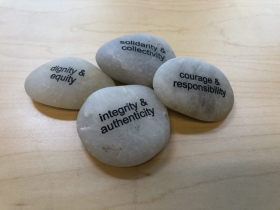You are here
Beyond Equity, Toward Liberation

Related Blog Posts
The rest of philanthropy is finally hearing what health and environmental funders have been saying for years: we have multiple crises we need to attend to, and they are inextricably linked!
Accelerated climate change, worsening quality of life and decreased life expectancy for communities of color, all of which are exacerbated by increasing economic inequality and heightened racial injustice, are just some of the issues HEFN and its members have been bringing attention to more broadly in philanthropy. And, as we grapple with how to restore and repair years of extraction from our planet and our people, we have increasingly heard from frontline communities that we don’t have the luxury of time, nor can we continue to remain satisfied with incremental change. As funders who likely hear some version of this refrain every day, is it time to move the goal post from equity to liberation?
Last year, Justice Funders was invited by HEFN to lead a Community of Practice program to support HEFN members in making the case to their institutional decision-makers to invest more grantmaking dollars in racial equity and grassroots organizing. Taking components from the Harmony Initiative, Justice Funders’ leadership development program for social justice grantmaking, we led a six-month journey with a cohort of HEFN members and staff to explore some of the most critical grantmaking practices to consider, including:
- Funding small, grassroots organizations that are building power in low-income communities and communities of color to win policy changes that will improve health outcomes for people most impacted by environmental racism;
- Supporting the organizing strategies developed and led by frontline communities, as opposed to grantmakers creating and imposing their own strategies; and
- Including leaders on the frontlines of environmental justice in funding decisions.
By the end of the year, several cohort members reported success in expanding funding for racial equity and grassroots organizing -- which we could think of as a win for equity or a first step towards liberation.
Equity Is Just the Beginning
One of the things we learned from facilitating the HEFN community of practice is that when we move the goal post, more becomes possible. Equity becomes a means to an end, rather than an end in and of itself.
In other words, the playing field matters. We can remain satisfied with the goal of achieving equitable health outcomes within an extractive economic system that will continue to endlessly harm low-income communities and communities of color, in which we will always have another battle to fight. Or we can expand our imaginations to liberate ourselves from the extractive economic system altogether, and proactively work to build a society that inherently values the health and well-being of all people and the planet we live on.
In such a society, the communities most impacted by the extractive economy will also have self-determination over the solutions that are implemented and how philanthropic resources are allocated.
At Justice Funders, we believe that achieving justice and liberation for low-income communities and communities of color requires a radical re-imagination of what’s possible, so we aren’t endlessly “fighting the bad” but that we are simultaneously “building the new.”
At the core of this re-imagination is the need for a Just Transition away from the current, extractive economy toward a regenerative economy. And since the accumulation and distribution of philanthropic wealth is a critical component of our overall economy, we believe that philanthropy itself must undergo a Just Transition toward a way of practicing that is non-extractive and truly regenerative for all people and the planet.
What Does a Just Transition for Philanthropy Look Like?
Like all other forms of wealth in the United States, philanthropic wealth can be directly traced back to industries that relied on economic practices of extraction and exploitation, such as the theft of Indigenous land and genocide of Indigenous people, the kidnapping and enslavement of millions of African people, the systemic undervaluing of “women’s work” and the destruction of natural systems and the web of life. Because philanthropic wealth comes from these historic (and current) extractive practices, our field has a moral obligation to redistribute this wealth to communities from which it was extracted.
At the same time, we must recognize that grants alone (which merely represent approximately 5 percent of a foundation’s financial assets) are insufficient to eradicate the harm these practices have caused. We can no longer treat the investment of our endowments as separate from our grantmaking. For example, philanthropies that give generous grants to organizations working to prevent climate change are completely undermining their mission if their endowments are invested in the fossil fuel industry, which is responsible for driving climate change.
Yet simply divesting from harmful industries isn’t enough. We must proactively invest in economic enterprises that build local, regenerative and democratic economies while ensuring that our investments are providing more value than they extract. This includes investing in worker-owned cooperatives, community land trusts and other entities that are community-controlled and democratically governed. Investing in these enterprises requires philanthropy to reject the endless accumulation of wealth (by de-prioritizing a maximum return on investment) and actualize our field’s potential to support the collective capacity of communities in their production, rather than consumption, of resources and wealth.
The grassroots organizations that are ushering a Just Transition are doing this very work: they are simultaneously resisting the extractive economy while also building new economies that build wealth in low-income communities and communities of color. Inspired by their visionary leadership, Justice Funders is excited to work with our peers in philanthropy to expand our imaginations beyond equity and toward liberation, and to adopt regenerative practices that realize a new vision of philanthropy that redistributes wealth, democratizes power and shifts economic control to communities.
If this is a vision that aligns with yours, we invite you to check out our newest resource, Resonance: A Framework for Philanthropic Transformation - a guide to support you and your philanthropic institution in accelerating a Just Transition. We hope that you will join us in imagining a world that works for all of us, and philanthropy’s role in creating it.
Dana Kawaoka-Chen is the Executive Director of Justice Funders, a partner and guide for philanthropy in reimagining practices that advance a thriving and just world. With special thanks to Maria Nakae, Senior Engagement Director of Justice Funders.
From our Blog
Upcoming Events
|
Jul 16 2024 Zoom |
Jul 18 2024 Zoom |

